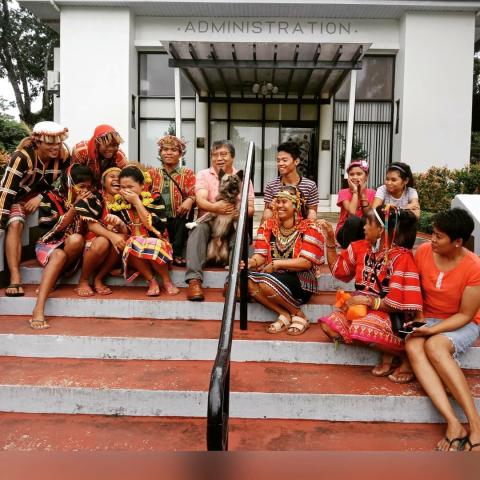Seminary students in the Philippines join Indigenous farmers in the struggle for land rights and justice.

For the last decade, I have been teaching at Union Theological Seminary in the Philippines. Part of the curriculum is a field education program, which requires students to participate in community activities such as protest marches and weekend exposures during the semester; as well as six-week community immersions during the summer. During those immersion experiences, students live, eat, sleep, and work with vulnerable communities. They listen to the community stories, share in their joys and pains, and seek to understand their struggles and aspirations as a people.
Students stay in communities like those of the Lumad. The Lumad are Indigenous peoples with ancestral, mineral-rich lands in the mountains in Mindanao. Many Lumad are resisting the entry of large-scale mining companies to their lands and experience harassment from the military in their schools and communities, almost on a daily basis.
When the Lumad’s alternative schools were closed down by the government, they sought sanctuary with the seminary. They had been accused of being breeding grounds for rebels or terrorists. Many Lumad are forced to flee several times a year when threats seem immediate, but they always return to their land. Some of our students committed themselves to ensuring that the Lumad felt at home; while the seminary raised funds for food, they found ways to buy toiletries, food, medicines, and other essentials…enough for 65 people for 30 days!
This semester, students began to participate regularly in the “bungkalan” at Lupang Ramos (Ramos Land). Bungkalan literally translates “to till the soil.” The act of tilling soil in farmland is nothing spectacular, except when the land one is tilling is contested. This piece of land is 372 hectares, and was made public in the 1930s. Since that time, 300 peasant families have cultivated the land continuously. In 1965, a wealthy family started to claim the land for themselves and the farmer-residents became workers. In 1990, the family attempted to bulldoze and flatten the agricultural lands so that the 372 hectares could be used for real estate. Women farmers resisted, defending their position and their crops, and to this day continue to face pressure, including from armed guards, to give up their struggle for the land.
Last semester, several students from our seminary began to cultivate portions of the land with the farmers during the weekend: buying seeds and seedlings with their own money, planting, harvesting, and selling their crops with the proceeds going to the farmers’ association in Lupang Ramos.
Over a month ago, our students were asked by the farmers to pray with them, and so in the past few weeks, they have been holding ecumenical worship services where pastors and priests, many of them still students, preach and serve the Eucharist. Every day and every hour, farmers and allies stand watch for the armed guards who continue to harass the peasant communities. When the farmers were faced with a court case, they came to students to seek help. When the farmers were beaten by goons, the students were among the first to respond.
On October 20, on another island in the Philippines, nine farmers were killed in Negros Occidental Province. Three of them were women and two were minors. Three of the bodies were burned. The farmers' union had started to occupy Hacienda Nene, which is contested land like Lupang Ramos. Farmers want only to cultivate land they have tilled for generations — land which should have been made theirs during the land reform programs of the 1980s. As they were resting in their tents they were attacked by about 40 armed men.
These are the realities for vulnerable communities in the Philippines, and these are the realities our students are responding to.
I sometimes fear for the safety of the bravest and most committed of our students, particularly the women, and have reminded them to always evaluate the risks. Sometimes I feel that they are now far away from academic classrooms where they used to sit and struggle with theories and concepts. I think they have taken to heart what Jesus says in our gospel text: “Truly I tell you, just as you did it to one of the least of these who are members of my family, you did it to me" (Matthew 25:45).
Feeding the hungry today requires more than just giving them food or teaching them how to plant, fish, or farm. As a matter of fact we there is no need to teach these skills because communities been planting, fishing, and farming all their lives. Everett Mendoza, a Filipino theologian, said, “Nothing less than a radical transfer of wealth and power can change the situation. The Christian faith claims that God, though rich, became poor in Christ. The world’s richest must become poor so that the poor of the world may live.”
Today, the poor and hungry are still struggling for food. But they do not need our charity. They need our radical generosity, our radical hospitality, and our radical solidarity. This is what is required to inherit the kingdom from the one who was divine, but became human as the greatest act of radical solidarity of all.
— Lizette Pearl Tapia was named by the National Council of Churches in the Philippines (NCCP) to be the 2018 Anne Duncan Gray Visiting Scholar at Emmanuel College in Toronto. The NCCP is a United Church of Canada global partner.
Does this blog pique your interest in people-to-people opportunities with global partners? Perhaps you or your faith community would like to host a global partner. We invite you to find out more at the People in Partnership webpage or by emailing us at pip@united-church.ca.